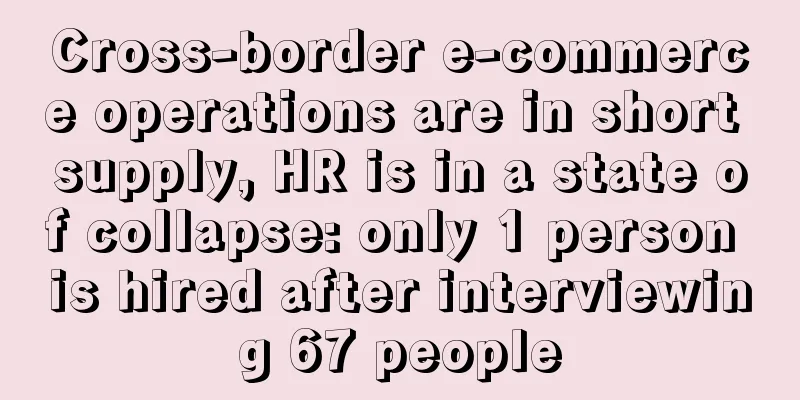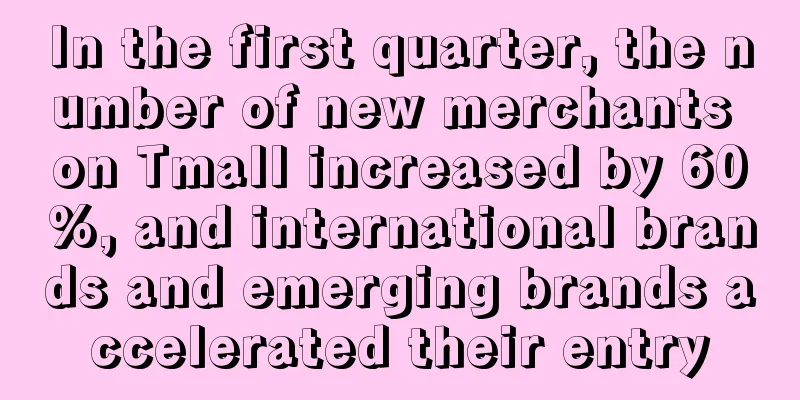Cross-border e-commerce operations are in short supply, HR is in a state of collapse: only 1 person is hired after interviewing 67 people

|
This year, a large number of companies have entered Amazon from different industries, and the operating pressure on old sellers has doubled. The influx of new sellers has also caused a war for operational talent, and the difficulty of HR recruitment has increased dramatically: seeing new resumes in the middle of the night and immediately inviting them, interviewing 6 people who passed but none of them came, and offering a salary of 15k but still being snatched away... Obviously, high-quality operations have become the most scarce talent at the moment.
Only 1 person was hired after interviewing 67 people, HR collapsed due to operational shortage
Since the beginning of the year, cross-border e-commerce operations have become a hot commodity. One of the reasons is that a large number of companies have entered platforms such as Amazon, and the demand for operational talent has skyrocketed.
Compared with other industries, the salary level of operations is far ahead. The application requirements of the industry are not high, generally "college degree or above, good English foundation", fresh graduates or those with half a year of Amazon experience can start from 6k-8k, and in Shenzhen, the salary for more than half a year of operation experience starts from 8k. With such generous treatment, will cross-border e-commerce companies quickly complete recruitment? The answer is no.
Recently, a cross-border e-commerce HR sent a message in the recruitment group:
In March, 98 people were invited, 67 were interviewed, 27 passed, and only 1 finally got the job because "there were other options." This situation is surprising, but similar situations are not uncommon in the cross-border e-commerce circle. After a sincere communication, HR expects the interviewee's reply, but often receives the following:
——"Thank you very much for the opportunity to interview. I feel your sincerity... I am very sorry that I can't start work tomorrow." ——"I think the distance is too far, and there will be traffic jams on the way to and from get off work. I won't go there tomorrow..." …
A seller in Longhua, Shenzhen, was very frustrated: "We interviewed 6 people, but no one came." How serious is the shortage of people in the cross-border e-commerce industry? The seller said that he registered a BOSS job search account and received 7 greeting messages in just 10 minutes, and it was already after 11:30 p.m.
A company's HR reported that the company recently interviewed several operations personnel, but none of them came because they disliked the low salary. The matching salary is lower than expected, which may be the main reason for the operations personnel to reject the company after passing the interview. "Our company is reluctant to spend money to recruit people, and we have not been able to recruit them." said an operations person.
So what is the average salary level for operations in the industry? Sellers reported that the base salary in some cities is as follows:
Shenzhen: 8K for half a year of experience, 10K+ for more than two years of experience; Shanghai: 4.5K for fresh graduates , about 5.5K for one year of experience; Xiamen: 4K; Yantai: three years of experience, 3-4K; Anhui: 3.5K capped; Nanjing: Basic salary 3.5K …
Taking Shenzhen as an example, why can an operator get a base salary of 8K after only six months in the industry ? A seller said: "There are too many unknowns for fresh graduates, and their abilities are uncertain. After training, they may leave in a few minutes. If they don't create profits, they still have to pay wages. It's better to pay a little more and hire someone with experience."
Another Shenzhen seller lamented that those with more than one year of experience need to be offered 8K, otherwise they can’t hire good people. Even if they lower the salary, the people they hire may not stay long.
In addition to the low recruitment success rate, low salaries also make it difficult to attract senior talents . An operator complained: "The company hired two new people to train, but these two people have no desire for knowledge and no initiative. They look like they just found a job to get by. There is nothing we can do. The company's salary and benefits are unattractive. There is no threshold for recruitment, so we can only train such people slowly."
In the competition for talent, there is no best salary, only better. One seller said: "Many companies came in this year, all trying to recruit people. There was an operations interview, and the operator asked for a commission of 9K1a. The operator directly gave her a commission of 15K2a and asked her to come to work. As a result, the next day she said she had found a company with better treatment."
The influx of new Amazon sellers not only competes with old sellers for operational talent, but also puts tremendous pressure on old sellers in terms of operations.
New companies are rushing into Amazon , and old sellers are feeling an unprecedented sense of crisis
Due to the epidemic, traditional channels have been affected, and a large number of foreign trade companies have poured into the cross-border e-commerce industry. Large numbers of domestic e-commerce sellers have also rushed to layout this track; at the same time, the popularity of the industry has attracted a large number of cross-industry entrepreneurs, and even the rural areas of the mainland have been swept by the cross-border gold rush. Coupled with the active practitioners who have been working alone after a year or two, the era of Amazon for all has arrived.
With the influx of new sellers, many old sellers have an unprecedented sense of crisis. This is reflected in the following aspects:
1. The number of listings in each sub-category has exploded
An Amazon seller said that this year, he felt a huge number of new sellers entering the market from all channels, and the competition in each category was fierce. The number of listings in each sub-category showed explosive growth, and the market demand was increasingly saturated!
2. Inventory costs are as high as 10 million
Because of the unstable logistics timeliness, sellers need to prepare goods in advance, and inventory costs have risen sharply. A seller with monthly sales of 2 million US dollars said that after statistics, he found that his inventory costs have exceeded 12 million yuan, and the money he received was basically just a round of paperwork and then invested in stocking up.
3. There is no niche in product selection, and every corner is fighting for it
As competition intensifies, some veteran sellers say that product selection is becoming increasingly difficult! Every day, I look at the new product list, and occasionally I can see a few good-looking products in different categories. After a closer look, I find that the market is already saturated. After looking day after day, I still have no clue. I have no resources, so I can only wander around 1688.
Industry insiders said that nowadays, hot-selling categories are almost monopolized by some big sellers. Previously, small and medium-sized sellers could explore opportunities in categories with less competition, but now they find that unpopular categories are also slowly being penetrated. As one seller said: "There is no so-called unpopular category now, and every corner is fighting!"
4. Advertising is too expensive and new products are too difficult to promote
As more sellers sell similar products, some old sellers have the intuitive feeling that it is becoming increasingly difficult to promote new products this year.
With the traffic pool unchanged, more new products suddenly emerge, and traffic will become more and more expensive. Sellers who have opened ads say they can't afford it. There are only clicks but no conversions. Creating new products is time-consuming and costly, and more often than not, new products are just pushed in vain.
5. If the product is not selling well, the price will be reduced, and a price war will be started.
When competition in all aspects is fierce, price wars are inevitable. As the number of categories of products increases, one of the common practices used by many sellers is to reduce prices when the products are not selling well.
There is no lowest price, only lower prices. In order to win the shopping cart and get a higher search ranking, many sellers lose money to earn "tomorrow". One seller said that the price has been reduced to the lowest, and there will be no profit if it is reduced further. However, when he saw that his peers lowered their prices again, he really couldn't bear it anymore. If it continues like this, everyone will just be making wedding clothes for the "brother-in-law", and in the end he will end up with nothing.
Industry service providers frequently receive investment, but the most popular ones are still water sellers
Faced with increasingly fierce competition , some sellers began to envy suppliers and service providers with stable revenue . One seller said, "If I have enough money, I would rather be a supplier, the kind where I pay for goods and receive them at the same time."
The cross-border e-commerce industry is in a period of rapid development. From Internet giants to capital companies, many have invested. It has been a long time since news of cross-border e-commerce sellers receiving investment came out, but the service provider group has received good news frequently:
In the fourth quarter of last year, Lingxing ERP completed a RMB 70 million Series A financing, led by Hillhouse Capital and Shunwei Capital, and followed by Blue Lake Capital.
In mid-February, Captain BI completed its Series A financing with a financing scale of nearly RMB 100 million. Eastern Bell Capital led the investment, Tongchuang Weiye continued to increase its investment, Zongteng Group followed suit, and Mountain View Capital served as the exclusive financial advisor;
In mid-March, Jijia announced the completion of a 30 million yuan Pre-A round of financing, led by Yunqi Capital, followed by Zhuopu Capital and strategic resource parties ...
In just half a year, several service providers specializing in serving Amazon sellers have received tens of millions or even hundreds of millions of dollars in investment. It is not difficult to see that capital forces are more optimistic about the "water sellers" in the industry .
Cross-border e-commerce is gaining popularity, and everyone is digging for gold with a shovel. The industry will accelerate from a period of dividends to a period of red ocean. Who will benefit the most from this process? As one seller said: "As the industry rises, the people who make the most money will always be those who sell shovels."
In any industry, there are people who make money while others who are fooled. As a cross-border seller, competition is inevitable. There is no need to envy others for making money. The key is to think about how you can stay until the end. |
<<: Why do DTC brands prefer micro KOLs?
>>: Russia's demand for household and repair supplies rises, with orders up 77%
Recommend
What is Modalyst? Modalyst Review, Features
Modalyst Suppliers offers millions of bestselling ...
What is Stryze Group? Stryze Group Review, Features
Stryze Group is a leading direct-to-consumer (D2C)...
What is Ramp? Ramp Review, Features
Ramp is a fintech company that provides corporate...
What is Blockchain.com? Blockchain.com Review, Features
Blockchain.com is a full-stack crypto services pl...
Canadian department store Hudson's Bay transforms and vows to take on Amazon through new markets
Hudson's Bay was founded in 1670 and is headq...
Anker's suppliers made a fortune!
Suppliers who seize the right opportunity. With s...
Cainiao joins Zero 100, the world's top supply chain club
It is reported that Cainiao has been invited to j...
Amazon lost nearly 8 million users in a few months. Did they all go to Temu next door?
Recently, a research institute's survey resul...
Rail freight in the United States is congested, with containers stranded for an average of 9.8 days!
Recently, due to serious congestion in ports such...
The peak season is approaching, and a large number of ocean freight surcharges are coming...
Some time ago, Amazon Global Store released a mes...
With a growth rate of 300%, the monthly transaction volume of Hiver, a Korean male e-commerce company, exceeded 10 billion won
" Hiver ," a men's app operated by ...
The average order value is US$200! Shenzhen sellers have opened up a new platform in half a year
In the cross-border e-commerce industry, multi-ch...
What is Visualsoft? Visualsoft Review, Features
<span data-docs-delta="[[20,{"gallery"...
Many popular children's toys on Amazon have been recalled
In recent years, safety incidents caused by child...
Where are the overseas opportunities this year? AliExpress: Continue to invest in the European and American markets, and increase investment in new markets in Japan, South Korea and the Middle East
Where are the overseas opportunities for cross-bo...









